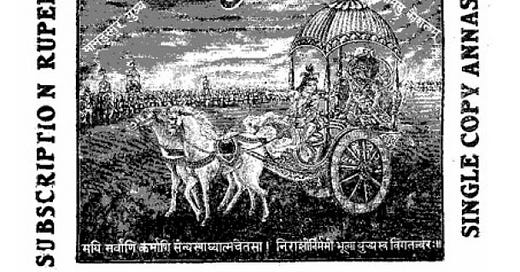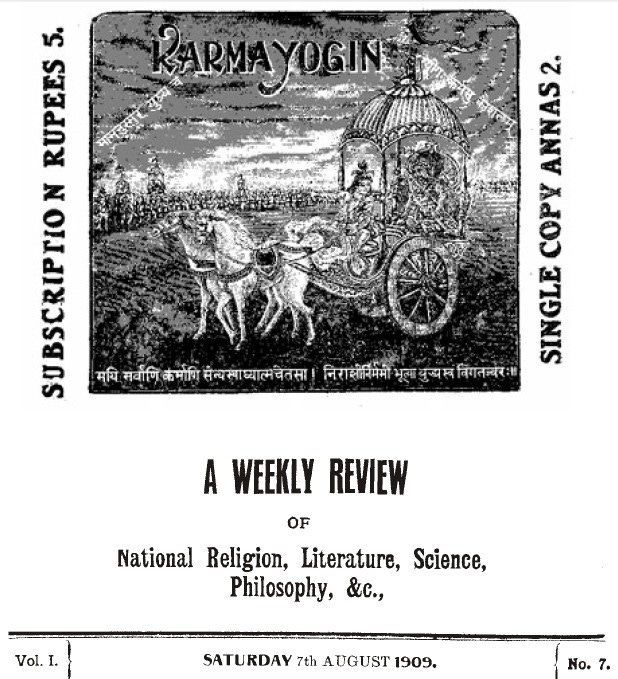Democracy still packs a punch
A 1909 essay by Sri Aurobindo and the Jan 6 Indictment of D.J. Trump
I started off my last post as an edited compilation of passages from the final episode of Rachel Maddow Presents: Déjà News, without mentioning that in the second half of the post I was going to quote some exceedingly relevant passages from a chapter written by Sri Aurobindo in 1950. This might have been off-putting to certain readers of Aurocafe who aren’t exactly fans of Rachel Maddow.
In the passage quoted at the end of the post, Sri Aurobindo writes:
As in the practice of the spiritual science and art of Yoga one has to raise up the psychological possibilities which are there in the nature and stand in the way of its spiritual perfection and fulfilment so as to eliminate them, even, it may be, the sleeping possibilities which might arise in future to break the work that has been done, so too Nature acts with the world-forces that meet her on her way, not only calling up those which will assist her but raising too, so as to finish with them, those that she knows to be the normal or even the unavoidable obstacles which cannot but start up to impede her secret will.
I am presently compiling the individual indexes, which I created for most of the 36 text volumes of the Complete Works of Sri Aurobindo, for inclusion in the forthcoming Reference Volume. Looking up the entry “Bhoga, and nigraha and saṁyama,” I rediscovered an essay that Sri Aurobindo wrote about 6 months before his arrival in Pondicherry. Titled “The Process of Evolution,” it first appeared in the Karmayogin of 18 September 1909. The Karmayogin was “A Weekly Review of National Religion, Literature, Science, Philosophy, &c.”, of which Sri Aurobindo was the editor. It appeared between June 1909 (the month after Sri Aurobindo’s acquittal and release from Alipore jail) and February 1910 (when Sri Aurobindo left Calcutta for Chandernagore in French India).
Because “The Process of Evolution”1 spells out in considerable detail the process summed up in the sentence just quoted, I reproduce most of it here.
The end of a stage of evolution is usually marked by a powerful recrudescence of all that has to go out of the evolution. It is a principle of Nature that in order to get rid of any powerful tendency or deep-seated association in humanity, whether in the mass or in the individual, it has first to be exhausted by bhoga or enjoyment, afterwards to be dominated and weakened by nigraha or control and, finally, when it is weak, to be got rid of by saṁyama, rejection or self-dissociation. The difference between nigraha and saṁyama is that in the first process there is a violent struggle to put down, coerce and, if possible, crush the tendency, the reality of which is not questioned, but in the second process it is envisaged as a dead or dying force, its occasional return marked with disgust, then with impatience, finally with indifference as a mere ghost, vestige or faint echo of that which was once real but is now void of significance. Such a return is part of the process of Nature for getting rid of this undesirable and disappearing quantity.
Saṁyama is unseasonable and would be fruitless when a force, quality or tendency is in its infancy or vigour, before it has had the enjoyment and full activity which is its due. When once a thing is born it must have its youth, growth, enjoyment, life and final decay and death; when once an impetus has been given by Prakriti to her creation, she insists that the velocity shall spend itself by natural exhaustion before it shall cease. To arrest the growth or speed unseasonably by force is nigraha, which can be effective for a time but not in perpetuity. It is said in the Gita that all things are ruled by their nature, to their nature they return and nigraha or repression is fruitless. What happens then is that the thing untimely slain by violence is not really dead, but withdraws for a time into the Prakriti which sent it forth, gathers an immense force and returns with extraordinary violence ravening for the rightful enjoyment which it was denied. We see this in the attempts we make to get rid of our evil saṁskāras or associations when we first tread the path of Yoga. If anger is a powerful element in our nature, we may put it down for a time by sheer force and call it self-control, but eventually unsatisfied Nature will get the better of us and the passion return upon us with astonishing force at an unexpected moment.
Here Sri Aurobindo begins to discuss the internal process “by which we can effectively get the better of the passion which seeks to enslave us.” This will be of interest to the practitioner of yoga (in Sri Aurobindo’s sense of the term), but presently we are concerned with the external manifestations of the process. You can read the complete essay here.
The law is the same for the mass as for the individual. The process of human evolution has been seen by the eye of inspired observation to be that of working out the tiger and the ape. The forces of cruelty, lust, mischievous destruction, pain-giving, folly, brutality, ignorance were once rampant in humanity, they had full enjoyment; then by the growth of religion and philosophy they began in periods of satiety such as the beginning of the Christian era in Europe to be partly replaced, partly put under control. As is the law of such things, they have always reverted again with greater or less virulence and sought with more or less success to reestablish themselves. Finally in the nineteenth century it seemed for a time as if some of these forces had, for a time at least, exhausted themselves and the hour for saṁyama and gradual dismissal from the evolution had really arrived. Such hopes always recur and in the end they are likely to bring about their own fulfilment, but before that happens another recoil is inevitable. We see plenty of signs of it in the reeling back into the beast which is in progress in Europe and America behind the fair outside of Science, progress, civilisation and humanitarianism, and we are likely to see more signs of it in the era that is coming upon us.
A similar law holds in politics and society. The political evolution of the human race follows certain lines of which the most recent formula has been given in the watchwords of the French Revolution, freedom, equality and brotherhood. But the forces of the old world, the forces of despotism, the forces of traditional privilege and selfish exploitation, the forces of unfraternal strife and passionate self-regarding competition are always struggling to reseat themselves on the thrones of the earth. A determined movement of reaction is evident in many parts of the world and nowhere perhaps more than in England which was once one of the self-styled champions of progress and liberty. The attempt to go back to the old spirit is one of those necessary returns without which it cannot be so utterly exhausted as to be blotted out from the evolution. It rises only to be defeated and crushed again. On the other hand the force of the democratic tendency is not a force which is spent but one which has not yet arrived, not a force which has had the greater part of its enjoyment but one which is still vigorous, unsatisfied and eager for fulfilment. Every attempt to coerce it in the past reacted eventually on the coercing force and brought back the democratic spirit fierce, hungry and unsatisfied, joining to its fair motto of “Liberty, Equality and Fraternity” the terrible addition “or Death”. It is not likely that the immediate future of the democratic tendency will satisfy the utmost dreams of the lover of liberty who seeks an anarchist freedom, or of the lover of equality who tries to establish a socialistic dead level, or of the lover of fraternity who dreams of a world-embracing communism. But some harmonisation of this great ideal is undoubtedly the immediate future of the human race. On the old forces of despotism, inequality and unbridled competition, after they have been once more overthrown, a process of gradual saṁyama will be performed by which what has remained of them will be regarded as the disappearing vestiges of a dead reality and without any further violent coercion be transformed slowly and steadily out of existence.
This bears repeating: “the force of the democratic tendency is not a force which is spent but one which has not yet arrived, not a force which has had the greater part of its enjoyment but one which is still vigorous, unsatisfied and eager for fulfilment.” Nor is it likely that “the immediate future of the democratic tendency will satisfy the utmost dreams of the lover of liberty who seeks an anarchist freedom, or of the lover of equality who tries to establish a socialistic dead level, or of the lover of fraternity who dreams of a world-embracing communism.” I find it remarkable that, in this regard, Sri Aurobindo’s thinking has remained virtually unchanged over his four decades in Pondicherry, as the 1950 statement quoted above suggests.
On a personal level, I also find it remarkable that I chanced upon this essay the day after the Trump Jan. 6 Indictment — actually half a day after, considering the time difference between Pondicherry and Washington, DC — for it renews hope that the force of democracy still packs a punch.
Sri Aurobindo, Essays in Philosophy and Yoga, pp. 33--37 (Sri Aurobindo Ashram Publication Department, 1998).




“[Biological life] is still in accordance with the environment, and not yet truly "from the formed towards the forming”. At the extreme limit of the contradiction, the evolution leads to the life of man. Of course, this is the result of the work of the historical life for many millions of years. At the extreme limit of acting life from the formed towards the forming, a stage is reached where the subject lives by submerging into the environment, and the environment is environment by negating itself, and becoming subjective.”
(NK, The Unity of Opposites, in Intelligibility and other essays, p.196)